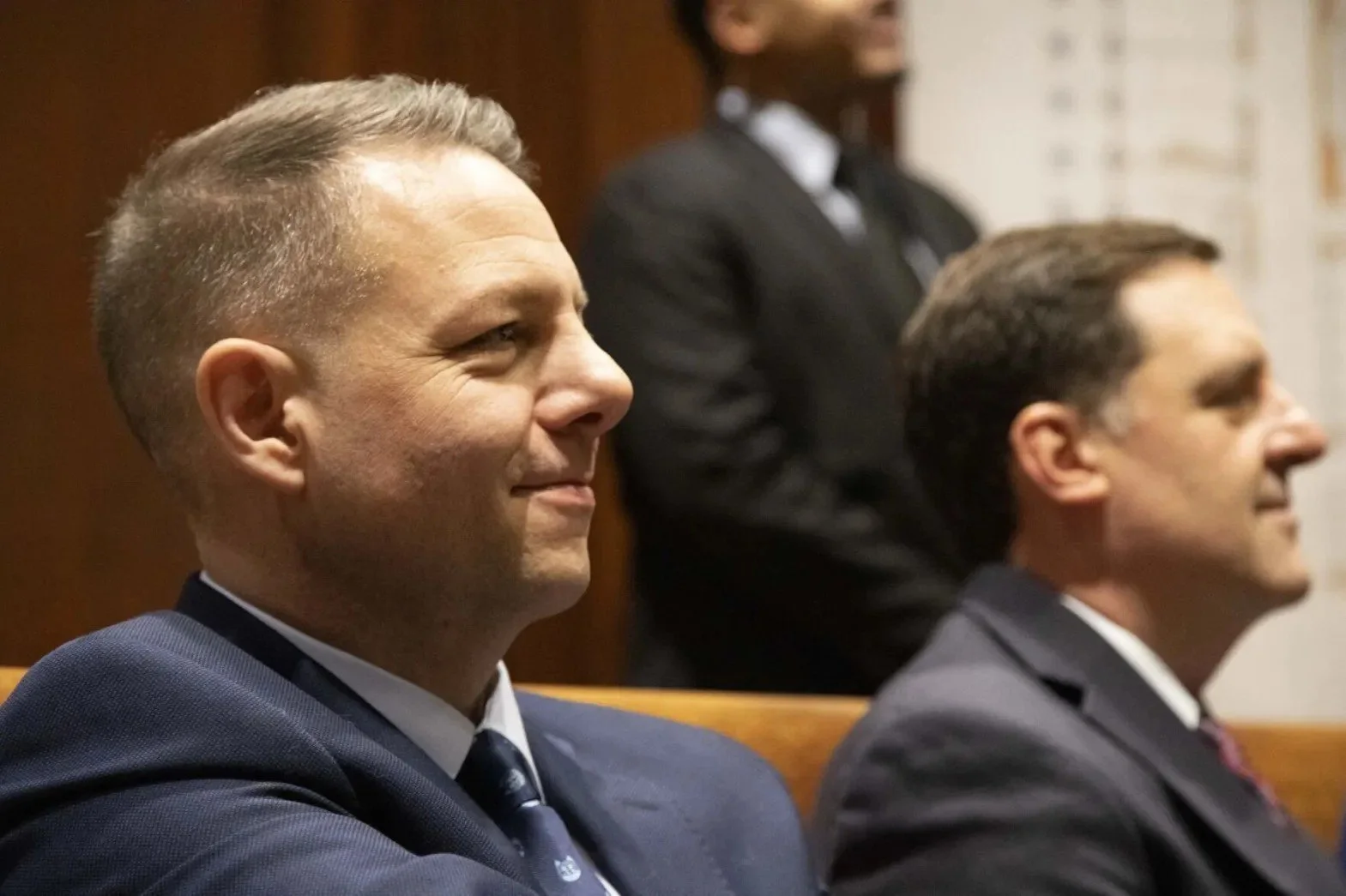Lawmakers opt to stick with single-year funding for local roads
State Rep. James Arciero of Westford, left, listens at a House Democratic caucus on Jan. 1, 2025. (Chris Lisinski/SHNS)
Published by Lowell Sun
By Chris Lisinski / State House News Service
July 12, 2025
BOSTON — A key legislative committee moved forward on a nearly $1.2 billion borrowing bill that embraces Gov. Maura Healey’s push for more road maintenance funding while rebuffing her attempt to authorize half a decade of money at once.
The Transportation Committee on Wednesday advanced a redrafted version of Healey’s proposal to soup up the program supporting local road and bridge repairs and to supplement it with even more funding for other infrastructure programs.
The updated bill (H 4257) calls for a one-year, $300 million bond authorization for the Chapter 90 program, including a change to how some dollars are allocated designed to support more rural communities, and $885 million in borrowing to support other maintenance programs, culverts and small bridges, and congestion relief efforts.
While lawmakers retained Healey’s proposed tweaks to the Chapter 90 funding distribution and her push to increase the annual allotment, they opted to stick with a single year of funding instead of embracing her idea to approve $1.5 billion for the next five years.
Rep. James Arciero, who co-chairs the Transportation Committee, said his panel “wanted to proceed with caution.”
“Traditionally, we’ve funded this program for one year. This year, we certainly had robust discussions about [a longer timeline], but we agreed to move forward with this legislation favorably out of committee on a one-year appropriation of $300 million,” the Westford Democrat said in an interview. “With uncertainty on the federal level, we felt it necessary to increase this funding for communities across the state but also to proceed with caution.”
The Chapter 90 program reimburses cities and towns for maintenance of local roads and bridges.
Under the bill on the move, $200 million would be distributed according to the traditional program formula, which considers factors such as road mileage, population and employment. Another $100 million would be distributed based solely on road mileage, which lawmakers and Healey administration officials believe will aid western and central Massachusetts municipalities with long stretches of roadways and smaller tax bases.
Sen. Brendan Crighton, the committee’s other co-chair, said legislators “want to make sure our rural communities have the resources they need.”
The legislation would also authorize $500 million in bonding to support the Department of Transportation’s lifecycle asset management program, which focuses on roadways that do not receive federal aid, as well as $200 million for culvert replacement and $185 million to tackle “congestion hotspots.”
“There’s a lot of great stuff in this bill. It’s a 50% increase in the traditional Chapter 90 program,” Arciero said. “In our hearing on Chapter 90, we certainly heard from a number of communities about the need for a grant program for culvert repair and restoration, especially with the changes we’ve seen to the climate. In my district, north-central Mass., there was huge flooding just last year. There’s pieces here for additional repairs for our worst roads and bridges across the state, specifically dealing with these pavement issues.”
All representatives and senators on the Transportation Committee voted in favor of advancing the measure except for Rep. David DeCoste of Norwell and Sen. Lydia Edwards of Boston, who did not weigh in, according to Arciero’s office.
The bill will head next to the Bonding Committee for additional review. It’s not clear when legislative leaders plan to bring it forward for a vote in the House.
Healey’s original bill (H 53) envisioned the same $200 million-$100 million annual split in Chapter 90 funding, and the same $885 million in additional bonding. The only change the Transportation Committee made — albeit a major one — was to limit the Chapter 90 bond authorization to $300 million for a single year instead of $1.5 billion for five years.
“Given the uncertainty we face from the federal level, doing a one-year authorization made sense at this time,” Crighton, a Lynn Democrat, said.
Municipal leaders have long clamored for both an increase in funding, arguing that the program has not kept up with inflation, and multiple years of authorization at once, which they say would allow them to more easily plan larger repair projects.
In April, the governor told the Transportation Committee a five-year authorization “provides greater certainty to these cities and towns,” pitching it as a way to safeguard against the prospect of federal funding cuts and economic downturn.
For more than a decade, Beacon Hill has typically replenished the Chapter 90 program once per year with $200 million, sometimes adding extra money partway through the cycle or simultaneously funding related grants.
The Legislature and Healey last month agreed to steer an extra $80 million to Chapter 90 using extra revenue collected through the voter-approved surtax.
